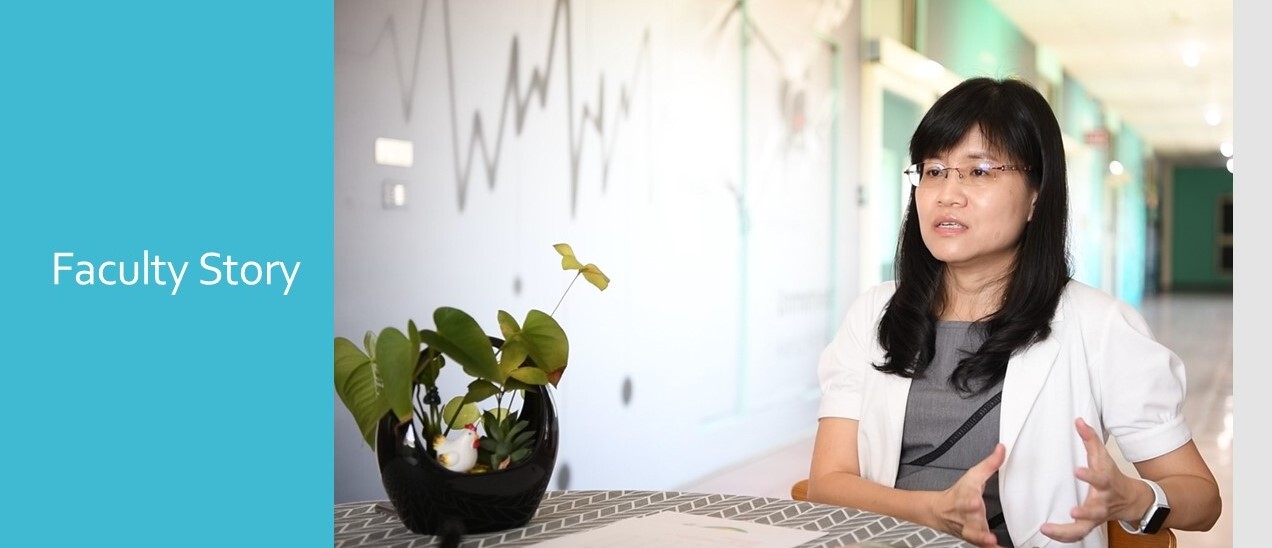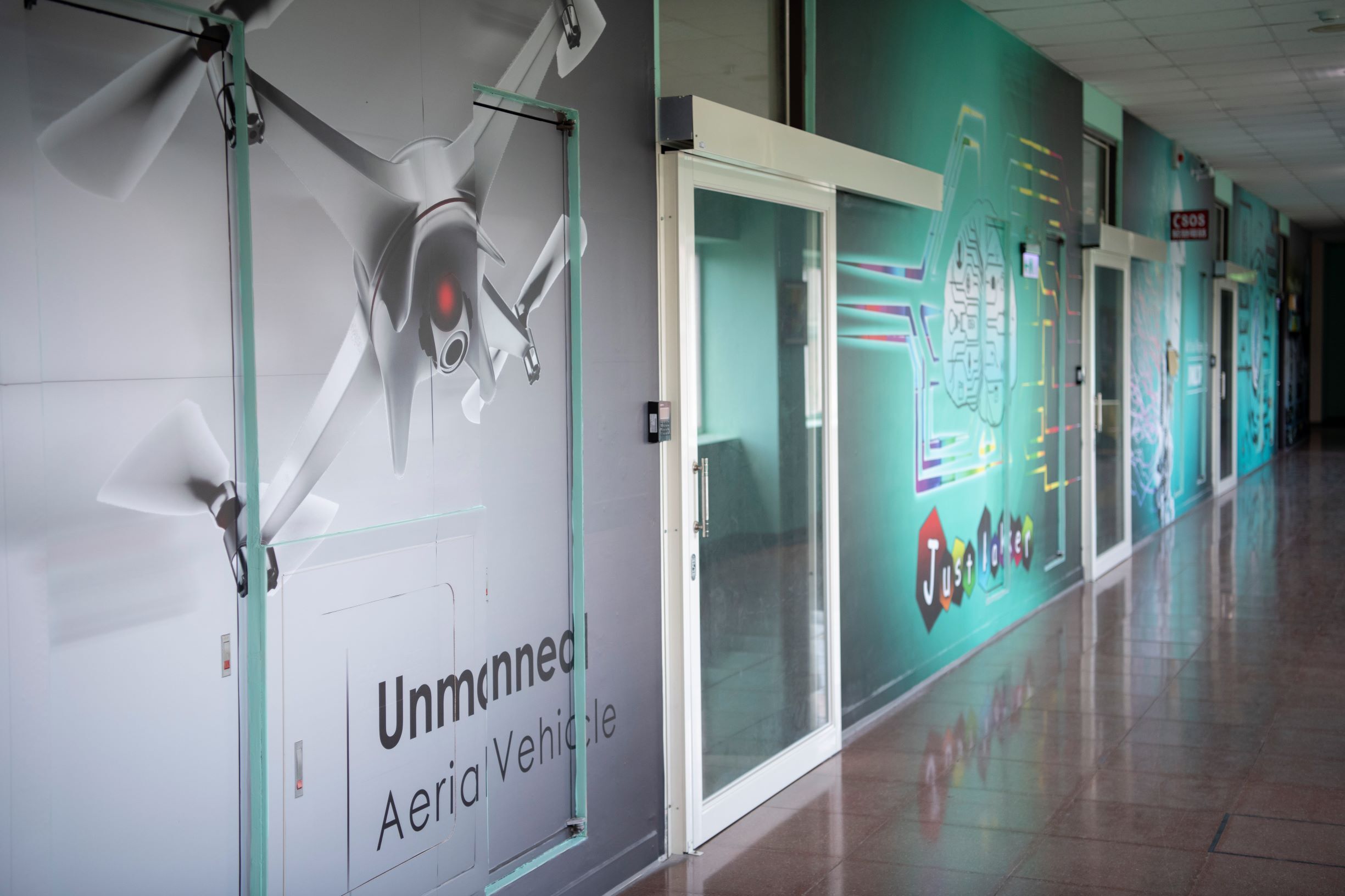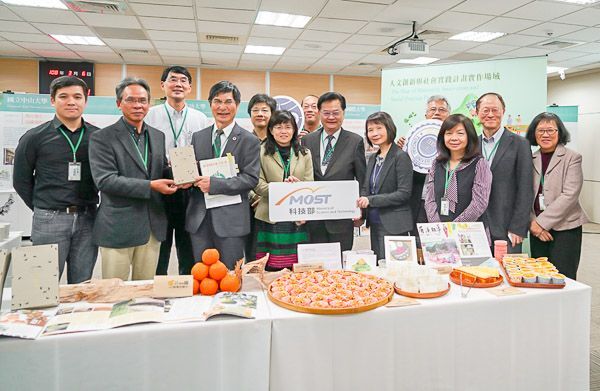Fervent incubator of NCNU's AI talents — Professor Lee Pei-jun

The National Chi Nan University’s Department of Electrical Engineering is housed within the College of Science and Technology, where labs for making semiconductors take up the first floor, circuit design research rooms line the second floor, a big data-IoT-5G integrated workshop on the third, office space on the fourth, and a state-of-the-art development center for unmanned aerial vehicles, artificial intelligence, and inventive projects on the top floor. The building’s bright teal walls accentuated by science-inspired imagery conveys the confidence with which the Department of Electrical Engineering carries its youthful, innovative self into a bright future.
As a budding AI hub, Taiwan began making this field the driving force behind its high-tech industry in 2017, with a five-year government investment program that will sponsor a total of NT$16 billion by 2022. By the good foresight of department chair Lee Pei-jun (李佩君) and her colleagues, NCNU has successfully upgraded its research environment and teaching resources for training new talents to meet the growing labor demands of the meteoric AI industry.
The primary tenets of machine intelligence — electronics, networks, and communications — have long been the academic forte of NCNU. In the two decades since its inception, the Department of Electrical Engineering has forged alliances with industrial and academic partners including the Central Taiwan Science Park, Taichung Veterans General Hospital, AU Optronics, and Taiwan’s National Space Organization, as well as a coalition of 30-plus companies from the nanotechnology sector.
The joint ventures with the state agency for space affairs are particularly noteworthy for the research and development of satellite transmissions and remote-sensing, audiovisual compression, and image-processing. However, this is just the start of NCNU’s AI path, which can only be mapped out by proper integration of resources and effective communications among different departments.
The path began two years ago, when NCNU President Dr. Yuhlong Oliver Su approached Lee, who is known for her expertise in 3D displays, with the departmental chair offer. Ever since that day, the new chairwoman began making preparations for the Department of Electrical Engineering, and eventually NCNU as a whole, to become synonymous with the field of AI.

Lee’s passion, curiosity, and patience have also refueled faculty efforts in maintaining and upgrading the physical and academic settings of the department. The AI DreamFactory established in 2018, for example, transforms classroom walls from drab to large swaths of crystalline beaches, bathing students in sunshine. With a lesser age gap between the youthful instructors and their students, a high degree of interactivity and problem-solving discussions now characterize the classroom atmosphere. “These [environmental] changes have made the students more relaxed and initiative, such as greeting us with ease.”
Lee added that the NCNU population is largely made up of students who were comfortably in the top- or second-tier level during high school. “In Taiwan, those from the countryside who place in public universities through the nationwide examination system are usually the most academically studious youths of their villages.”
As for the most prevailing reason driving enrollment to NCNU’s electrical engineer programs? Financial security, stated Lee. Even though up to 80% of undergraduates choose to continue on an academic track with graduate studies, the other 20% either pursuit overseas programs or enter the workforce at a monthly wage average of NT$50,000 — about NT$18,000 more than the starting salary of their counterparts from the arts and humanities.
“Students of NCNU are very pure, none of the teachers here want to extinguish that light,” she explained. “I often spend time thinking about how we can nurture a different class of students, qualified in both intelligence and integrity?” Foundational skillsets aside, Lee is also looking to strengthen narrative skills and sales experience that will help these students stand out in the tech field with their excellent communication skills.
The NCNU Department of Electrical Engineering is also marked by a high percentage of international enrollment at one per five students, and the largest range of English-language courses. This environment has enhanced the language abilities of the Taiwanese students as well, making it easier for them to apply for international exchange programs.

Building upon the inroads laid by her predecessors, Lee has achieved some of her own feats, including launching an inaugural program this fall on smart cities between the NCNU Department of Electrical Engineering and Germany’s Cologne University of Applied Sciences. Exchange students from Singapore’s Nanyang Polytechnic and several Japanese vocational institutes are also coming to Nantou for internship opportunities, bringing NCNU’s electrical engineering department to the forefront of the university’s globalization efforts.
Since joining the university in 2006, the professor has taken up a string of challenging projects with collaborators of the likes of Taiwan’s National Space Organization. In fact, prior to shouldering additional administrative tasks as departmental chair, Lee had the distinguished honor of being the author of the most-cited thesis among NCNU’s 300-plus instructors.
She has since shelved her personal research plans and sabbatical leave in favor of guiding the transformation of the department. Like the AI DreamFactory she started, the professor is committed to achieving her goals. Her drive is fortuitous for all the students of electrical engineering. (English Text by Min Chao)
Those who are interested in learning more about the professor and her field can contact her at pjlee@ncnu.edu.tw.


